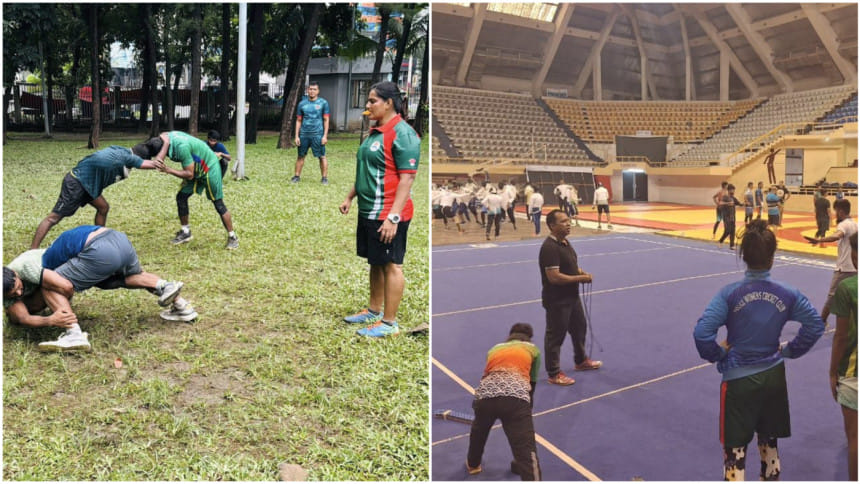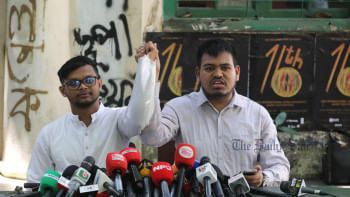Half the venue, athletes too many

Outside the Mirpur Shaheed Suhrawardi Indoor Stadium, an unusual sight unfolded. Wrestlers were training under the open sky -- sometimes on bare soil, sometimes on paved concrete -- sweating it out while puzzled passersby watched as if the arena itself had spilled onto the streets.
But why are national athletes forced into such hardship? The answer is simple: there is no space inside.
The stadium has only 1,800 square feet of floor area, a third of which is being used as a temporary camp by the Bangladesh Army. The rest is shared by four federations -- fencing, wushu, wrestling, and judo. With the South Asian (SA) Games scheduled for early 2026, each discipline has a number of athletes in camp. The numbers tell the story: fencing has 45, wushu 46, wrestling 52, and judo more than 50. Over 190 athletes are crammed into just a few hundred usable square feet. The question now looms: How can international-level preparation be possible in such conditions?
This is not the crisis of a single sport. Bangladesh has over 50 sporting disciplines, but most lack their own venues. Athletes are constantly on the move -- here today, somewhere else tomorrow. While local competitions are somehow managed, arranging long-term training camps before international events often turns into a logistical nightmare.
Inside the Mirpur indoor, four mats are laid side by side, accommodating the four federations' joint camp. Each day, over a hundred athletes train together. But the lack of space makes it nearly impossible for anyone to prepare properly, creating a chaotic and unsafe environment.
When all four federations practice at once, clashes are inevitable. Arguments break out, forcing training sessions to stop midway.
Wushu player Biplob Rudra echoed this sentiment, saying, "When we train with weapons, there's always a fear that we might accidentally hit others practicing nearby. That creates mental pressure. We can't give our hundred percent. If the space was larger, we would feel less stressed and perform better."
To avoid this, athletes try to manage by coming in at different times. But with everyone needing the same, many federations are still forced to train in overcrowded conditions.
That is why the scene outside is often so different. Wrestlers, unable to find room inside, practice on hard concrete or bare ground. Wushu players jump and spin in open spaces. Even fencing and judo athletes are forced to "borrow" space from others. Such interruptions break training rhythm and frustrate athletes.
Pointing at the ropes marking the practice area, fencer Hasan Ali explained: "When an opponent attacks, I try to block with my sword, but the rope gets in the way. It stops us from doing it properly."
Only a sigh could be heard in the voice of wushu federation coach Mejbah Uddin.
"Everything else is fine, but the space is the problem. It's too small. Yes, we trained here and won gold in 2010, but now with four federations together, the trouble has multiplied. If we had our own stadium, the results would be even better. At the very least, we need more space," Mejbah said.
A sports village could be the answer to all the problems, according to fencing coach Abu Zahid Chowdhury.
"What we need is a proper sports village. How can you expect serious preparation in this environment? Training shoulder-to-shoulder, there's no continuity. And before such a big tournament, you can't expect good results from this."
However, wrestling federation's general secretary, Mejbah Uddin Azad, was more pragmatic.
"We have to work with what we get. There's no separate venue, though it would surely help. We always share venues with other federations. Here too, many athletes just sit on the side because of the space crunch. Some are forced to train outside. We have to split into two or three groups."
While scarcity of space is a global issue, what makes the situation here more disheartening is that Bangladesh does have a number of stadiums -- though most remain unusable due to lack of proper maintenance.
With this being the reality -- spaces available, but not functional -- athletes who should be focused on their training, remain occupied with something that is out of their hands.
Such compromised training is not just limiting athletes physically but also weighing on them mentally. Their daily struggles are slowly dimming the fire within -- yet these very athletes carry the dream of raising the national flag on the international stage.

 For all latest news, follow The Daily Star's Google News channel.
For all latest news, follow The Daily Star's Google News channel. 



Comments